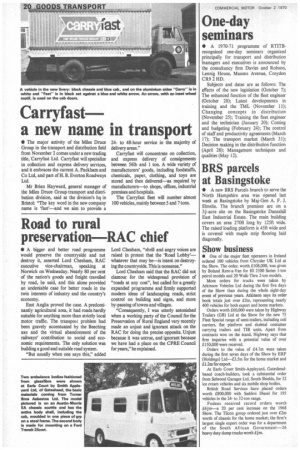Road to rural preservation RAC chief
Page 22

If you've noticed an error in this article please click here to report it so we can fix it.
• A bigger and better road programme would preserve the countryside and not destroy it, asserted Lord Chesham, RAC executive vice-chairman, speaking at Norwich on Wednesday. Nearly 80 per cent of the nation's goods and freight travelled by road, he said, and this alone provided an undeniable case for better roads in the twin interests of industry and the country's economy.
East Anglia proved the case. A predominantly agricultural area, it had roads hardly suitable for anything more than strictly local motor traffic. The transpoit problem had been gravely accentuated by the Beeching axe and the virtual abandonment of the railways' contribution to social and economic requirements. The only solution was building a good and suitable road system.
"But usually when one says this," added Lord Chesham, "shrill and angry voices are raised in protest that the 'Road Lobby'— whatever that may be—is intent on destroying the countryside. This is nonsense."
Lord Chesham said that the RAC did not clamour for the widespread provision of "roads at any cost", but called for a greatly expanded programme and firmly supported modern ideas of landscaping roads, strict control on building and signs, and more by-passing of towns and villages.
"Consequently, I was utterly astonished when a working party of the Council for the Preservation of Rural England very recently made an unjust and ignorant attack on the RAC for doing the precise opposite. Unjust because it was untrue, and ignorant because we have had a place on the CPRE Council for years," he explained.












































































































